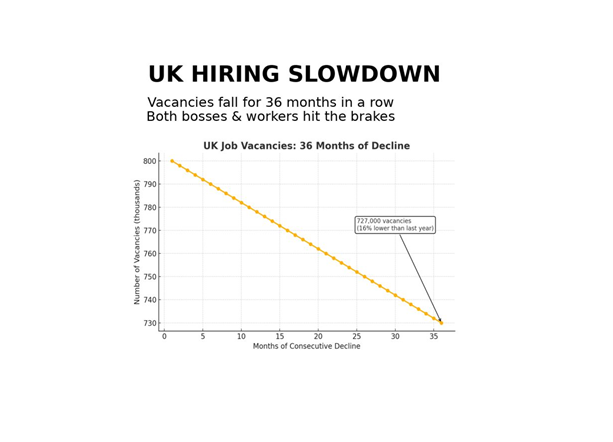Why have companies stopped employing people?
It’s a strange old time for work in Britain. Between trade wars, real shooting wars, a cost-of-living crunch, and Rachel Reeves sharpening her pencil at number 11, bosses up and down the country are quietly putting the brakes on recruitment. And those who already have jobs? Well, they’re hanging onto them for dear life.
The numbers don’t lie. Job vacancies have been sliding for what feels like forever — in fact, the Office for National Statistics says we’ve had 36 straight drops in the count. Right now, there are about 727,000 vacancies, roughly 16% fewer than a year ago and even lower than before COVID turned the world upside down. Recruiters say it’s the same story: permanent jobs are vanishing at the fastest pace since 2020, and temp work isn’t far behind.
Bosses Counting the Pennies – Why the caution? A lot of it comes down to cost. The National Insurance hike in April added around £25 billion to payroll bills nationwide. Throw in higher minimum wages, twitchy energy prices, and customers who are watching every penny, and you’ve got a recipe for holding off on new hires. Businesses don’t know if next year will bring tax cuts or tax hikes, and until they do, many are “labour hoarding” — holding onto the people they’ve got, hoping for calmer waters ahead.
Workers Playing It Safe – It’s not just companies being careful. Plenty of workers are staying put, even if they’re itching for a change. After the pandemic years, job security has taken centre stage, and folks figure it’s smarter to sit tight than risk ending up on the redundancy list. The result? A loop where fewer jobs advertised means fewer people moving, which just makes employers even more reluctant to hire.
Pay Growth Slows to a Jog – Pay packets are still getting bigger, but the pace has eased off. Wages are up by about 4.6 to 5% a year — not bad, but slower than before. It’s enough to give the Bank of England a headache: do they focus on cooling inflation, or worry about the slowing jobs market? Either way, it’s a tricky balancing act.

Is AI Stealing people’s jobs in the UK – Artificial intelligence is transforming the UK’s job market, and for some workers, the changes are already being felt in their pay packets—or rather, in the absence of them. While AI’s potential to boost productivity and create entirely new roles is undeniable, its arrival has also triggered a noticeable decline in certain types of jobs, particularly those at the entry level.
Since the public launch of ChatGPT in late 2022, the number of entry-level vacancies in the UK has fallen sharply. Figures suggest a drop of almost a third, with graduate, apprenticeship, and junior positions in retail, logistics, administration, IT, and finance being hit the hardest. A Guardian analysis points to AI as a contributing factor in the slowdown, though the impact has not been uniform across industries.
Large companies are already making significant workforce adjustments. BT, for example, has announced that its ongoing programme of job cuts—up to 55,000 by 2030—could deepen as AI capabilities expand. In the retail sector, Ocado’s Luton facility now uses robots to handle around 40 per cent of grocery packing, with expectations of reaching 80 per cent in the near future, reducing the need for human packers.
The scale of potential disruption is considerable. The International Monetary Fund estimates that 60 per cent of jobs in advanced economies such as the UK are exposed to AI, with roughly half of those potentially negatively affected. A UK government report suggests that between 10 and 30 per cent of jobs are highly automatable, with finance, law, management consulting, and teaching among the more vulnerable professions. London and the South East are particularly exposed due to their concentration of high-skill, white-collar roles.
Despite the fears, the numbers don’t tell a purely bleak story. The Tony Blair Institute forecasts annual private-sector job displacement peaking between 60,000 and 275,000, with a total of 1–3 million jobs potentially lost by 2050. Yet these figures are relatively modest compared to historic averages—around 450,000 jobs are lost and replaced each year due to technological and economic change. Crucially, the institute and other analysts stress that new roles, particularly in AI development, maintenance, and integration, are expected to offset many of the losses.
Globally, the World Economic Forum predicts that while nine million jobs may be displaced, 11 million new AI-related roles could be created. AI is already boosting demand for complementary skills such as digital literacy, problem-solving, teamwork, and resilience. For many professions, AI is not replacing workers outright but augmenting their abilities, freeing them from repetitive tasks and allowing more time for higher-value work.
Not all sectors are equally at risk. Hospitality, skilled trades such as electrical work and plumbing, and certain manual labour roles remain comparatively insulated from AI disruption. These fields require physical dexterity, adaptability, and in-person service that AI and automation have yet to replicate effectively.
In short, AI is “stealing” some jobs in the UK—most visibly in entry-level and process-driven roles—but it is also creating new opportunities and reshaping the skills employers value. The challenge for workers, businesses, and policymakers is to ensure that this transformation becomes a net positive, with adequate reskilling and adaptation to help people transition into the jobs of tomorrow. For those willing to adapt, the AI era may not mark the end of work, but rather the start of a very different chapter in the UK’s labour story.
What’s Next? – Will things pick up? Hard to say. The autumn statement might offer some answers on taxes and business support. But for now, bosses and workers alike seem to be sticking to the same mantra: “Do nothing and wait.”
Andrew Stanton CEO Proptech-PR
Andrew Stanton Founder & Editor of 'PROPTECH-X' where his insights, connections, analysis and commentary on proptech and real estate are based on writing 1.3M words annually. Plus meeting 1,000 Proptech founders, critiquing 400 decks and having had 130 clients as CEO of 'PROPTECH-PR', a consultancy for Proptech founders seeking growth and exit strategies. He also acts as an advisory for major global real estate companies on sales, acquisitions, market positioning & operations. With 200K followers & readers, he is the 'Proptech Realestate Influencer.'












